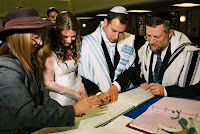In accordance with Jewish law, the State of Israel does not acknowledge civil marriages. Israeli law is sensitive to and tries to uphold Jewish religious traditions. According to the Talmud and other Jewish spiritual writings, marriages are legitimized by the wedding ceremony, which must be conducted by a religious official. Different religions within Israel, such as Christian and Muslim denominations are permitted to conduct marriages within their own places of worship by their own religious leaders. The Chief Rabbinate, the halakic authority for the state, must then determine whether or not marriages are valid. Acknowledgement by the state is not meant to override or dominate religious unions; rather, it is intended to strengthen and uphold the validity of those marriages.
Jewish couples living together and who are engaging in sexual relations are already assumed to be married, which is to say that they have the intent to be married. Jewish law states that the bride’s family must offer money (i.e., a dowry) to the groom and sign a contract transferring possession of the bride.
Likewise, couples are permitted to divorce based on the belief that just as individuals are capable of uniting in marriage, they are capable of destroying their union, and must therefore be permitted to part ways. There is debate regarding whether or not divorced women should be able to remarry a kohen. Israeli courts makes decisions on a case-by-case basis in matters of divorce. These decisions largely concern matters of alimony, child support, and the division of assets. Marriages can also be annulled if a woman is suspected of being used as a agunah, or concubine. ("Civil Marriage," Encyclopedia Judaica )
However, many people are negatively affected by Israel’s marriage policies. According to one source, “…today [in Israel], there are approximately ‘300,000 Israelis who cannot marry because one of the partners is not Jewish, or his or her Jewishness cannot be determined" (“Marriage in Israel” ). Solomon, an Ethiopian immigrant to Israel has experienced this problem first-hand. Although he and his family had always been Jewish, Israeli authorities denied that they could prove their Jewish status. This represents a discrepancy between Ethiopian law, which states that Jewishness is a patriarchic trait versus Israeli law, which states the opposite: that Jewishness is a matriarchic trait. Solomon explains his frustration: “How can I convert from Jewish to Jewish? I can’t be more Jewish. I grew up Jewish, praying three times a day, always keeping strictly kosher. I refused to go through that humiliating process [in Israeli law] to be accepted as a full Israeli Jew. I was so angry, I threw off my kippa” (Rosenthal 177-178).
Solomon decided to confront the Chief Rabbinate to explain his story. “I was furious. I told him I’ve been fighting a war for four years. Then I said, ‘You’ve never been in the army. How can you tell me I’m not Jewish enough to get married? I suffered to be a Jew in Ethiopia and now you’re making me suffer here?’ The rabbi still refused. I told him that I wasn’t going to leave his office until he signed the certificate. He reached for the phone and said he was going to call the police. I put my M-16 in his face and told him, ‘If you dial that phone, I’ll kill you. Sign the paper.’ He did and I walked out.” (Rosenthal 178).
I found an excellent explanation of the Israeli marriage problem at www.infolive.tv, but was unable to embed the video. I highly recommend checking it out.







No comments:
Post a Comment